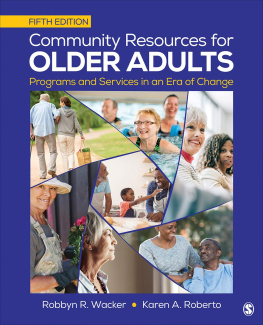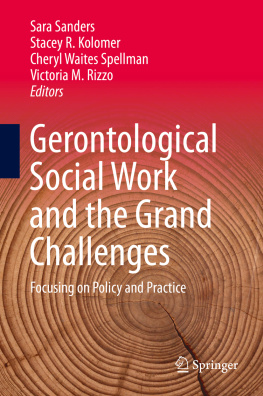THIRD EDITION
Psychotherapy
With
Older Adults
To my wife Patricia Knight, with love and gratitude
THIRD EDITION
Psychotherapy
With
Older Adults
Bob G. Knight
University of Southern California
Copyright 2004 by Sage Publications, Inc.
All rights reserved. No part of this book may be reproduced or utilized in any form or by any means, electronic or mechanical, including photocopying, recording, or by any information storage and retrieval system, without permission in writing from the publisher.
For information:
 | Sage Publications, Inc.
2455 Teller Road
Thousand Oaks, California 91320
E-mail: |
Sage Publications Ltd.
1 Olivers Yard
55 City road
London EC1Y 1SP
United Kingdom |
Sage Publications India Pvt. Ltd.
B-42, Panchsheel Enclave
Post Box 4109
New Delhi 110 017 India |
Library of Congress Cataloging-in-Publication Data
Knight, Bob.
Psychotherapy with older adults / by Bob G. Knight. 3rd ed.
p. cm.
Includes bibliographical references and index.
ISBN 0-7619-2372-1 (cloth : alk. paper)ISBN 0-7619-2373-X
(paper : alk. paper)
1. Psychotherapy for the aged. 2. AgedMental health. I. Title.
RC451.4.A5K59 2004
618.9768914dc222
2003019259
Printed on acid-free paper in the United States of America.
04 05 06 07 08 09 10 9 8 7 6 5 4 3 2 1
Acquiring Editor: | Jim Brace-Thompson |
Editorial Assistant: | Karen Ehrmann |
Project Editor: | Claudia A. Hoffman |
Copy Editor: | Catherine M. Chilton |
Typesetter: | C&M Digitals (P) Ltd. |
Indexer: | Molly Hall |
Cover Designer: | Michelle Lee Kenny |
Contents
Acknowledgments
J im Brace-Thompson, my editor at Sage Publications, initiated the idea that it was time to begin working on a third edition of this volume. He has been patient and supportive throughout the process, particularly during delays imposed by other professional demands, including grant administration and my becoming Director of Clinical Training in the University of Southern California Psychology Department. It is a running theme in our conversations that an oddity of our professional lives is that we typically meet at conventions all over the United States and Canada, even though we live in neighboring towns in Southern California. Claudia Hoffman and Catherine Chilton guided the book through the postproduction and copyediting phases with considerable skill, patience, and grace.
The intellectual and professional influences on me have multiplied and grown so much over the years that any listing is sure to be incomplete and therefore to delete some who should have been included. Margaret Gatz is a long-term colleague and has continued to influence my thinking about psychotherapy with older adults, especially when we coteach the course on that topic at USC. My students and clinical supervisees at USC constantly teach me as they learn from me. Sara Qualls of the University of Colorado at Colorado Springs, in many conversations at conventions, has stimulated my thinking about doing and teaching psychotherapy. Michael Duffy of Texas A&M has challenged me often to examine in new ways what I have said and written, and he was a key influence on my decision to include the chapter on psychotherapy with persons with dementia. David Powers and Lynn Snow also provided encouragement and inspiration for the chapter on dementia.
Several British geropsychologists have become strong influences on my thinking about this book and about psychotherapy with older adults, including Murna Downs, Mary Gilhooly, Fiona Goudie, Ken Laidlaw, and Bob Woods. Carolien Lammers helped to frame for me the distinction between approaches to psychotherapy rooted in life span developmental psychology and its concern with normal aging and those approaches that are more purely clinical and therefore rooted in the psychopathology of aging. This distinction highlights differences between national approaches to the topic as well as differences between training models within nations.
Lucio Bizzini at the University of Geneva Hospitals challenged me to think more about the distinction between healthy aging and frailty in later life and influenced changes in this edition. Inger Hilde Nordhus and her colleagues at the University of Bergen (Norway) were among the first to encourage me to think beyond the boundaries of the United States with regard to psychotherapy and aging, and they also provide a good model for theoretical integration of psychodynamic and cognitive behavioral approaches with older adults.
And, of course, thanks to all of the older adults who shared their lives with me or with the trainees that Ive supervised (and so with me via recording of their therapy sessions). Their active participation in, and resistance to, the therapeutic process is the foundation upon which this book rests.
Preface
T he knowledge base for psychotherapy with older adults continues to grow and to refine the image of later life that can inform and guide clinical work with older adults. Since the second edition of this book went to press in 1995, a number of books and handbooks related to this topic have appeared, and the pace of research both in clinical geropsychology and in the basic science of life span developmental psychology has increased. One goal of this revised edition is to incorporate these new findings, both in updating information and in revising the contextual, cohort-based, maturity, specific-challenge (CCMSC) model in some respects.
There are two new chapters in this volume. In several conversations with other clinical geropsychologists since the second edition appeared, I have been asked why I have not addressed working with clients who have dementing illnesses. When Sage asked me to work on this revision, the reviewers that they contacted also mentioned the lack of coverage of psychotherapy with persons with dementia in earlier editions. It is one marker of the changing attitudes toward psychological interventions with persons with dementia that this would be a consensus request at present. A chapter on working with persons at various levels of cognitive impairment appears in this edition.
The second chapter also covers an omission that occurred to me shortly after the publication of the second edition. Although I have been professionally involved in services to caregivers since 1980, helped to organize one chapter of the Alzheimers Association, and have been faculty director of the Los Angeles Caregiver Resource Center since 1989, the earlier editions of this book have not specifically covered psychological interventions with caregivers of the frail elderly. Clearly, caregiving is one of the specific challenges of later life and so deserves the new chapter devoted to it in this volume.
Another change in this volume is the incorporation of some of the case material from Older Adults in Psychotherapy (Sage, 1992). The integration of these case examples in abbreviated form into the discussion of psychotherapy is intended to enrich and provide concrete examples of the points covered in this discussion of changes in psychotherapy when working with older adults.








